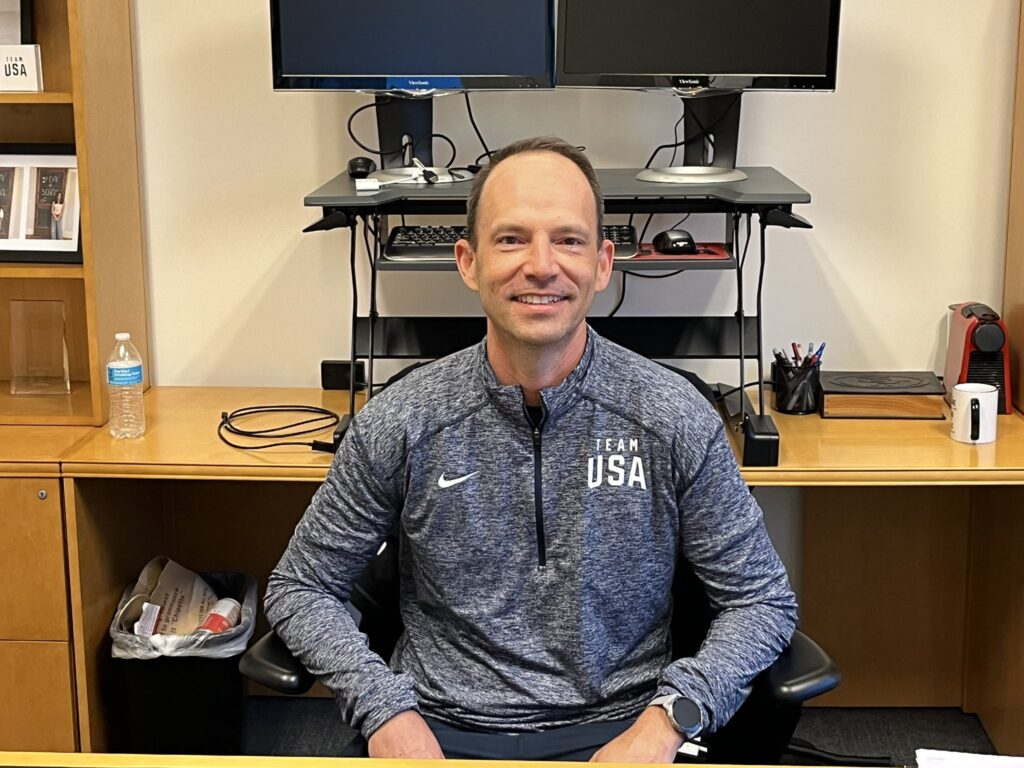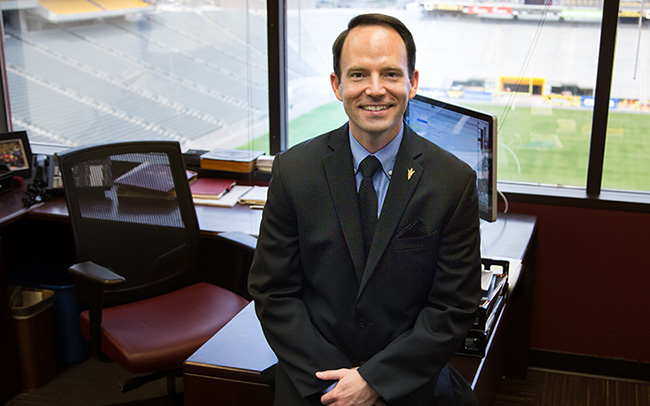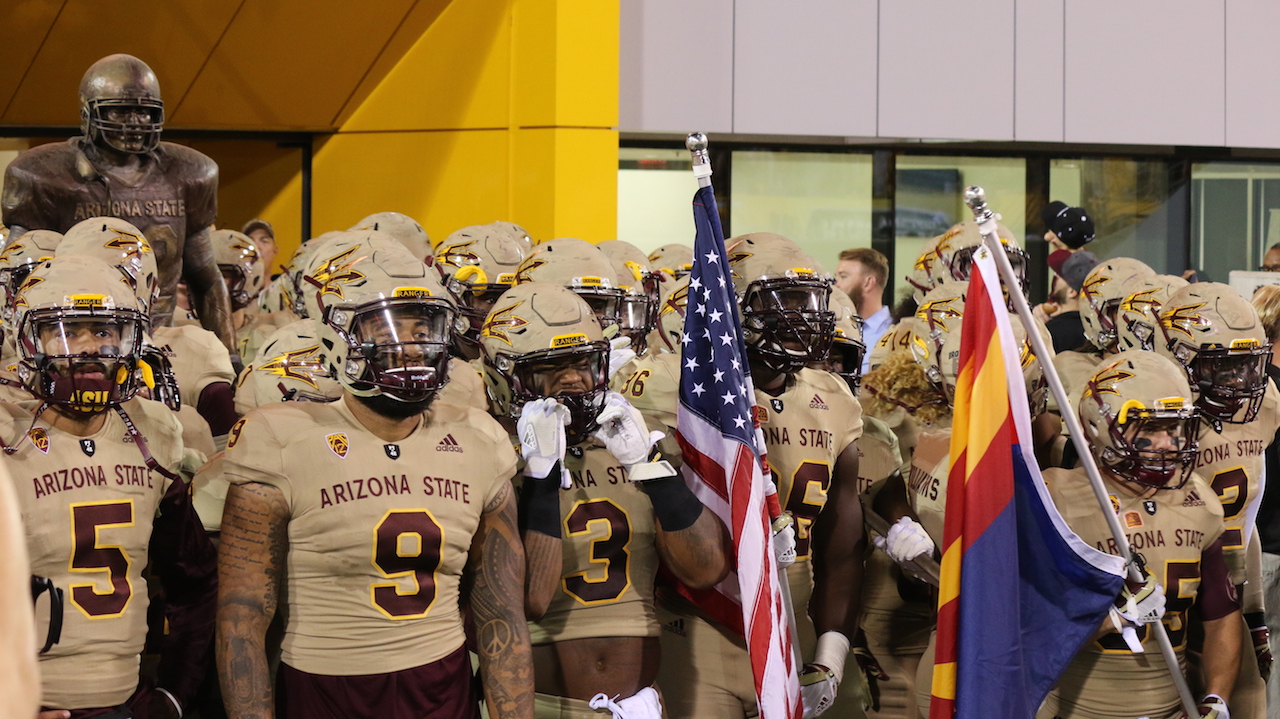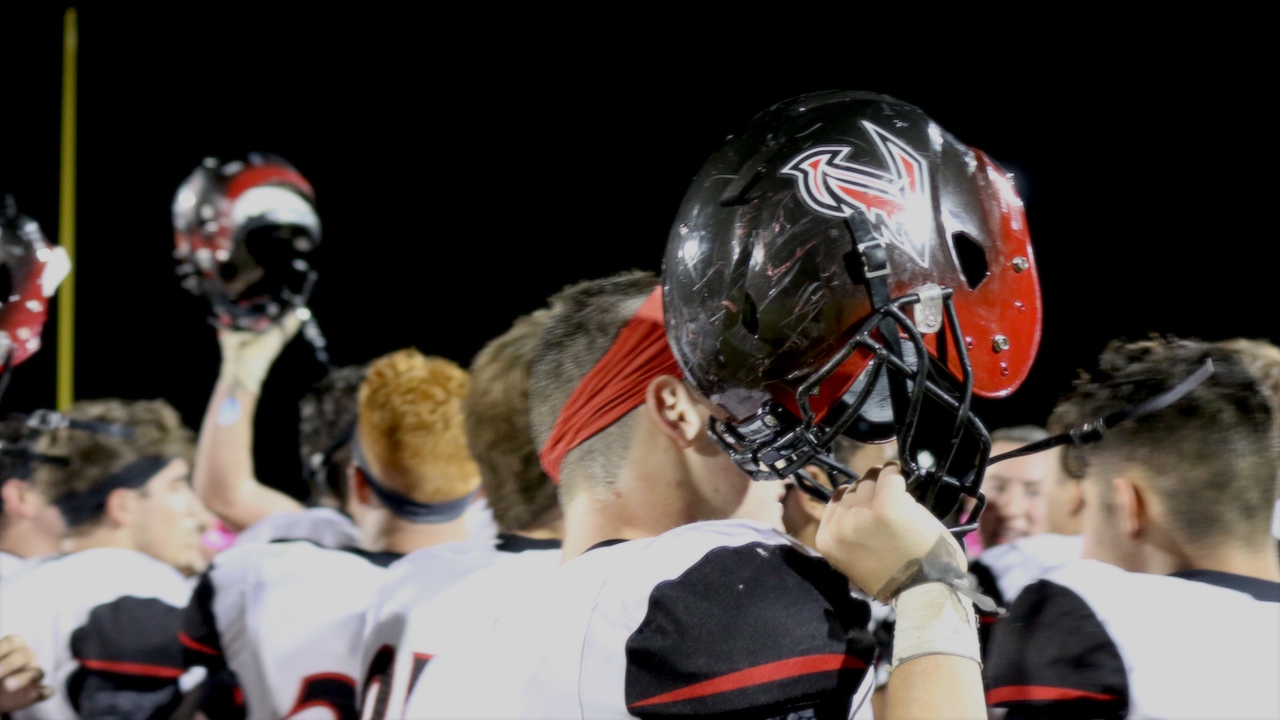COLORADO SPRINGS – Even as a child, Rocky Harris was a charmer.
At the grocery store or on the playground, he attracted others, a natural magnet. “He had that charisma,” says his father Carl, enough to earn the nickname Pied Piper. He was a social butterfly in junior high, memorizing a lengthy list of friends’ phone numbers in pre-cell days.
“We think he got switched at the hospital,” his mother La Verne says. “That someone gave us someone else’s child because he is way better than Carl and I.”
Harris demurs, crediting his father, an Arizona High School Athletic Coaches Hall of Famer, with steering him on a career path that’s elevated him to one of the most important positions in the U.S. Olympic & Paralympic Committee at a critical juncture for the nearly 130-year-old organization.
Instead of an NFL coach, once his ambition, Harris started in September as USOPC chief of sport & athlete services, second on the organizational chart behind CEO Sarah Hirshland. He will manage a staff of almost 300 and annual budget of $200 million under a USOPC restructuring designed to better serve its athletes at a time when their safety and mental health are as much of a priority as performance.
Carl Harris coached football and track over 32 years at three high schools in metro Phoenix. “I learned a three-point stance before I could walk,” says Rocky, insisting he’s not exaggerating. “We watched game film instead of sitcoms growing up. That was my life.”
But when he graduated from Arizona State in 2000, Harris bought into a vision of a different career route than that of his father.
“I would have been very happy had he gone into coaching,” Carl says. “But he had a real ability toward that (administrative) side of sports that I thought was remarkable. He had a way of dealing with people to where they really understood what he said.”
“I didn’t even know what he was talking about at the time,” Rocky says. “He really helped me connect the dots.”
From ASU to USA Triathlon
For more than a decade and a half, Harris steadily ascended through pro and college sports in a variety of roles, not realizing each stop was taking him toward the Olympic movement.
He worked in communications with the San Francisco 49ers and Houston Texans then marketing with Reliant Energy and the Houston Dynamo FC before returning to his native Arizona and alma mater as ASU senior associate athletic director.
He tells “anyone who will listen” about advice he received from Hall of Fame coach Bill Walsh, then 49ers general manager.
“He always preached about the importance of everyone’s job,” Harris says. “He said Rocky, your job (media relations coordinator) helps us win because you remove distractions by helping them (players) do one part of their job very well so they can focus on what they’re best at. That stuck with me forever.”
Harris, who grew up in Tempe, returning to ASU in 2012 was for him a dream marriage. Some wanted him to become athletic director when that job opened in 2014. NFL Executive Vice President Ray Anderson was hired instead with Harris promoted to athletics chief operating officer.
Anderson and Harris’ three-year collaboration was fruitful in capital facilities projects, including renovation of Sun Devil Stadium, and in sports expansion at a time when others were contracting. ASU added men’s hockey, women’s lacrosse and women’s triathlon (the first Power 5 conference school to do so) and reinstated men’s tennis.
ASU spearheading triathlon’s evolution from an NCAA emerging to championship sport brought Harris, a multi-sport competitor himself, to the attention of USA Triathlon at a time when it was transitioning leadership after the 2016 Rio Olympics.
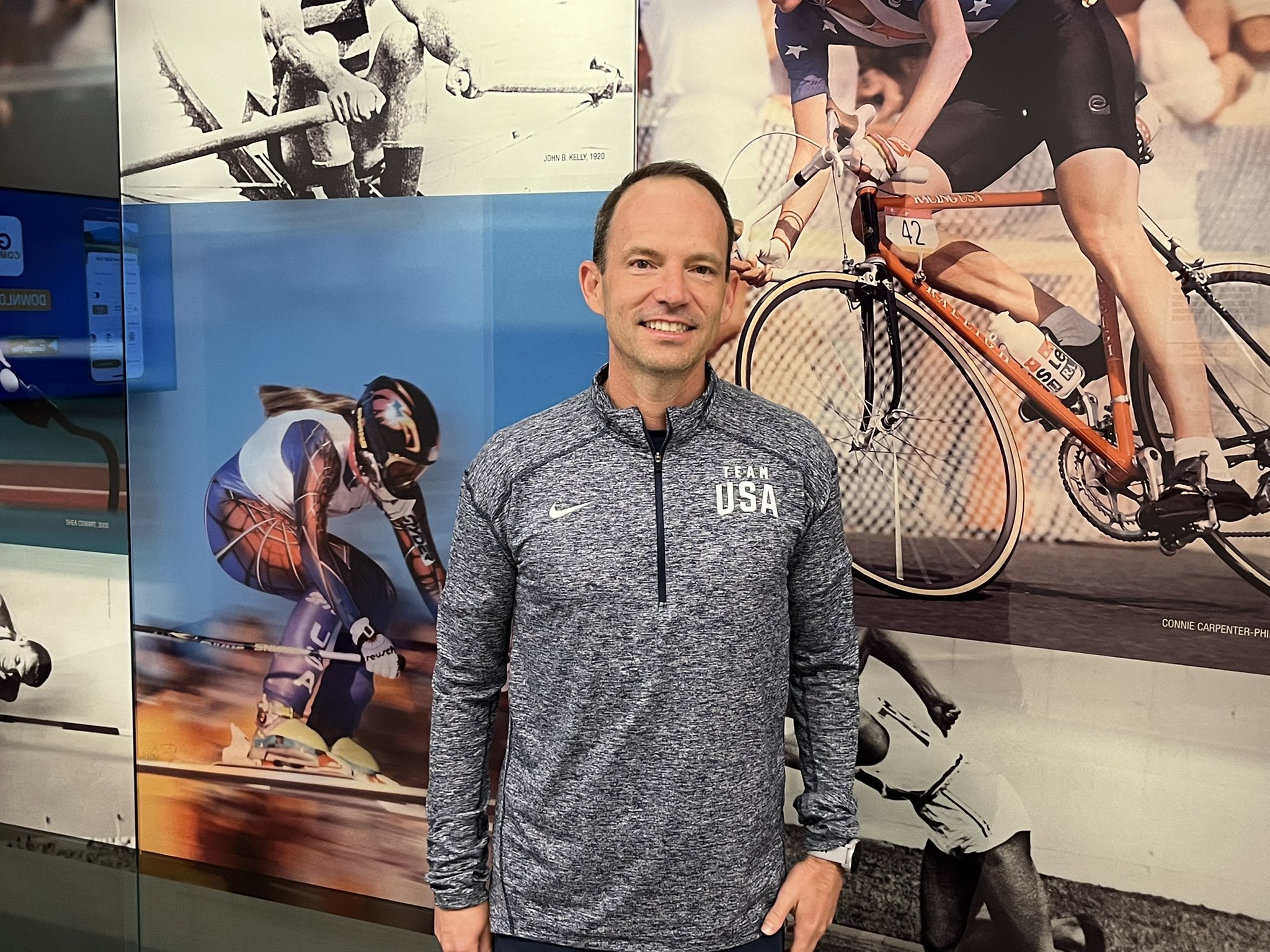 “When they contacted me, I told them I don’t even know what National Governing Bodies are,” Harris says. “That’s how ignorant I was other than I’m a triathlete (he completed Ironman Arizona on Nov. 20 in 12 hours, 26 minutes). I understood they served a role, but I didn’t understand what role.”
“When they contacted me, I told them I don’t even know what National Governing Bodies are,” Harris says. “That’s how ignorant I was other than I’m a triathlete (he completed Ironman Arizona on Nov. 20 in 12 hours, 26 minutes). I understood they served a role, but I didn’t understand what role.”
By late summer 2017, Harris had done enough research to realize USA Triathlon was an ideal fit for his first CEO opportunity and made the move to Colorado Springs, home of the USOPC and more than 20 of the 50 National Governing Bodies for individual sports
“I knew I’d be able to figure out the sport piece of it,” he says. “I didn’t know if I’d be good at being the head of an organization. What I found is I really loved serving the people that made the sport work.”
Barry Siff, who lives in Arizona, was USA Triathlon president when Harris was hired.
“I was thrilled when we were able to recruit him,” Siff says. “Everybody was happy except the big donors at ASU. They all joked about hating me that we took Rocky from Sun Devil nation and didn’t make any bones about it.
“I absolutely knew his career path would take him to the USOPC, I just didn’t know when and what into position. He’s a superstar.”
Learning the Olympic ropes
The most visible measure of Harris’ success in five years at USA Triathlon is seven combined Tokyo Olympic and Paralympic medals — most of any country in that sport — including silver in the first Olympic mixed relay.
His imprint goes much deeper than medals and beyond creation of Project Podium, to develop young male elite triathletes while allowing them to attend ASU, and a Paratriathlon resident team.
Harris transformed USA Triathlon’s culture, Siff says, while navigating the COVID pandemic in a sport reliant on membership participation for funding. He took on volunteer and leadership roles with the NGB Council, Para Advisory Council, SafeSport funding task force and became chair of the Association of Chief Executives for Sport.
“We can talk about financial stability and increasing sponsorships,” Siff says. “Those are all secondary. What was really accomplished was creating a collaborative culture and great relationships with all the stakeholders at USA Triathlon and outside. Those relationships (with Ironman, coaches, race directors, clubs) were maybe OK at best and Rocky, with a focus on great communication and listening, changed that. All of a sudden, we were all part of one team.”
Harris explains his management style this way: “I’ll fight when I need to, but I first try to bring people together. That’s really what our whole (USOPC) community needs right now.”
In November 2021, USA Triathlon extended Harris’ contract through 2028. Soon after, he and his wife Elizabeth donated $100,000 to the non-profit USA Triathlon Foundation in support of a new CEO excellence fund.
Suffice to say, Harris was not seeking a new job at the start of 2022 or even in April when the USOPC reorganized into five divisions and hired search firm Nolan Partners to find a replacement for Rick Adams in the expanded chief of sport & athlete services position.
“We didn’t have a lot of money growing up,” Harris says. “Security was really important to me. I had a long-term contract (with USA Triathlon) and I’m not going somewhere to be an at-will (non-contract) employee again. That’s very scary for me.”
Soon enough, though, NGB executives began lobbying Harris to consider the move. Hirshland, who came to the USOPC in 2018 from the U.S. Golf Association, talked to him about the opportunity, convinced he was the best candidate to stabilize her executive staff.
“The breath of his experience across sport really has given him exposure to so many different areas,” Hirshland says. “He’s been an incredibly strong leader, that was proven very quickly at triathlon. Every interaction I had with him, I was always impressed with his conviction and his judgment and his style. He emerged very quickly,” in the job search.
“He understands having to be scrappy. He understands the challenges of the small organizations (NGBs) and the realities of the resources they have to work with, and he has the respect of his peers because of that.”
Rebuilding faith in the USOPC
Ultimately, Harris couldn’t say no.
“My wife said you’re crazy not to consider this job,” after Harris explained all areas it impacts including collegiate partnerships, game operations and Olympic training centers. “She knows me better than anybody and said you’re going to regret this the rest of your life (if he passed on the offer). This is right in line with who you want to be and who you are.”
Elizabeth Harris, a cyclist, knows her husband with be working arguably twice as hard and be away from her and their three daughters, ages 6-12, more often.
Siff’s biggest concern for Harris is how he’ll maintain a healthy work-life balance, not whether he’ll succeed at a job universally described as daunting.
Pat Kelleher, promoted to USA Hockey executive director in 2017 when Harris joined USA Triathlon, became chair of the NGB Council in October 2020.
“I’m thrilled for Rocky and for the UOPC because this is a critical hire for all of us in the Olympic movement. It’s a perfect fit,” Kelleher says. “It’s great for the NGBs to have someone go into this role that knows the challenges we all face on a daily basis. It’s good all the way around and ultimately long term for Team USA and our athletes.”
The U.S. Olympic team has led in overall medals at the last seven Summer Games and eight of the last 10 going back to 1984. For bottom liners, nothing Harris does will be more important than seeing that streak continues through Paris (2024) and Los Angeles (2028) and ensuring Winter Games success (top five overall) at Milan-Cortina (2026).
Salt Lake City is a candidate to host the 2030 or 2034 Winter Games.
The complexities Harris faces are far beyond games themselves. He was barely a month into the job when the Yates report was released by the U.S. Soccer Federation with findings on sexual misconduct and abusive behavior in the U.S. professional National Women’s Soccer League. And more broadly, questioning effectiveness of the overburdened U.S. Center for SafeSport, created in 2017 to investigate sexual abuse allegations in Olympic sports.
“Our (Yates) investigation scope did not include an exhaustive examination of SafeSport practices, including its propensity to administratively close cases (without findings or sanctions),” the report concluded. “But it appears it does not have the resources necessary to promptly address the volume of complaints it receives.”
Fallout from the Yates report spilled over to USA Curling, whose CEO Jeff Plush resigned Oct. 28. Plush was NWSL commissioner from 2014-17 and, per the Yates report, was informed in 2015 of sexual abuse allegations against then Portland Thorns coach Paul Riley but took no direct action. Five days after Plush’s resignation, USA Curling chair Lynn LaRocca and two other board members resigned.
Harris believes over his five years at USA Triathlon that the USOPC and NGBs have improved in “owning” sexual misconduct like the Nassar case in gymnastics and others including in swimming. High profile U.S. athletes Simone Biles and Michael Phelps speaking out about safety and mental health increase pressure on the USOPC to be more accountable, transparent and proactive.
Phelps, who won 28 Olympic swimming medals, recently told Sports Illustrated that the USOPC “says they’re offering (mental health support), but they’ve not offering anything. I want people to actually do something. The sport psychologists that they have hired, we don’t feel safe and comfortable going to them. So there’s some kind of disconnect.”
Harris knows even with improved controls in place that rebuilding trust in the USOPC won’t come easy.
“What we’ve done with reform is get us to a place in the future where we can earn that trust back and people will start giving us the benefit of the doubt vs. looking for things we’re doing wrong,” Harris says. “And people will believe in the organizations because the behavior has consistently over time shown we’re not what we were. That’s the only way to do it. It takes time, action and doing what you say over and over again.
“The USOPC is not the enemy anymore because we’re doing the right things now.”
Bridge from LA 1984 to LA 2028
It’s a family joke but myth that Harris is named after fictional boxer Rocky Balboa, perpetuated because the film “Rocky” won the 1977 Best Picture Oscar two weeks after Harris was born.
Harris’ parents actually chose Rocky as a middle name. “I thought Brett R. Harris was dignified,” his mother says. “I wanted Rocky as a middle name in case he became an attorney or executive.”
In kindergarten, when it was still a toss-up between Brett and Rocky, the teacher asked for a name clarification. “Rocky is my love name,” Harris told her as his mom recalls. “People who love me call me Rocky.”
When he was 7, Harris first intersected in a meaningful way with the Olympics.
“My dad took me to McDonald’s (an Olympic sponsor from 1976-2017) and I got an LA Games hat,” he says. “I don’t think I ever took it off until it finally broke. It became this tangible thing connecting me to the (1984) Games. We watched every single event that year. I was absorbed in it.”
No wonder that Harris, upon donning a job wearing one of the most important Olympic hats, was so moved by the Mary Lou Retton photo mural on the wall outside his new office in downtown Colorado Springs. Retton was the star of stars at the 1984 Olympics, winning five gymnastics medals including all-around gold.
“That’s when it finally hit me,” Harris says. “It’s not some distant thing. This is real. Kind of like how it hit me when I walked into ASU the first day. I grew up going to games here as a little kid and now I’m here.”
He is the highest-ranking Arizonan ever on the USOPC professional staff. Sandy Baldwin was USOPC president and vice president (volunteer positions), Herman Frazier also was a vice president and Greg Harney held director/managing director jobs for 18 years.
Surprisingly, Harris feels more prepared starting out in this job than in any of his six prior professional positions. “I was in over my head in every single one of them when I took the job,” he says. “I knew I was going to learn on the job.
“When I came here (USOPC), I should have felt that way and didn’t. I felt comfortable with the complexity of the job before I got here. There will be overwhelming times, but the people here are so good that I don’t have to operate the details. It’s more about evolving the way we work.”
Jeff Metcalfe working for 46 years for newspapers in Colorado Spring and Phoenix. He has covered 15 Olympics.
